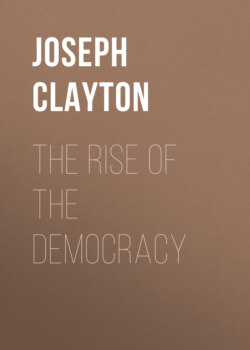Читать книгу The Rise of the Democracy - Joseph Clayton - Страница 23
На сайте Литреса книга снята с продажи.
The Great Churchmen
ОглавлениеWe are far from any thoughts of democracy in the early struggles against the absolutism of the Crown. The old love of personal liberty that is said to have characterised the Anglo-Saxon had no political outlet under Norman feudalism. What we note is that three Archbishops of Canterbury were strong enough and brave enough to stand up against the unchecked rule of kings, and the names of these great Archbishops—Anselm, Thomas à Becket, and Stephen Langton—are to be honoured for all time for the services they rendered in the making of English liberties. Not one of the three was in any sense a democrat. It is not till the latter part of the fourteenth century that we find John Ball, a wandering, revolutionary priest, uttering for the first time in England a democratic doctrine. Anselm, Becket, and Langton did their work, as Simon of Montfort, and as Eliot and Hampden worked later, not for the sake of a democracy, but for the restriction of an intolerable autocracy. All along in English history liberties have been gained and enlarged by this process of restriction, and it was only when the powers of the Crown had been made subject to Parliament that it was possible, at the close of the nineteenth century, for Parliament itself to become converted from an assembly of aristocrats to a governing body that really represented the nation.
But in considering the rise of democracy we can no more omit the early struggles against the absolutism of the Crown than we can pass over Simon of Montfort's Parliament, or the unsuccessful popular revolts, or the war with Charles I., or the Whig revolution of 1688. They are all incidents of pre-democratic days, but they are all events of significance. Democracy is no new order of society, conceived in the fertile mind of man; it has been slowly evolved and brought to birth after centuries of struggle, to be tried as a form of government only when other forms are outgrown, and cease to be acceptable.
All the great men—heroic and faulty—who withstood the tyranny of their day, not only wrested charters from kings, they left a tradition of resistance; and this tradition has been of incalculable service to a nation seeking self-government. It is easy to dismiss the work of Anselm and Becket as mere disputes between monarch and Churchman, to treat lightly the battle for the Great Charter as a strife between king and barons. Just as easy is it to regard the Peasant Revolt of the fourteenth century and Jack Cade's rebellion in the fifteenth century as the tumults of a riotous mob. The great point is to see clearly in all these contests, successful and unsuccessful, the movement for liberty, for greater security and expansion of life in England, and to note that only by a stern endurance and a willingness not to bear an irksome oppression have our liberties been won. In the winning of these liberties we have proved our fitness for democracy, for a government that will allow the fullest measure of self-development.
Now, what was it that Anselm contended for, first with William II. and then with Henry I.?
